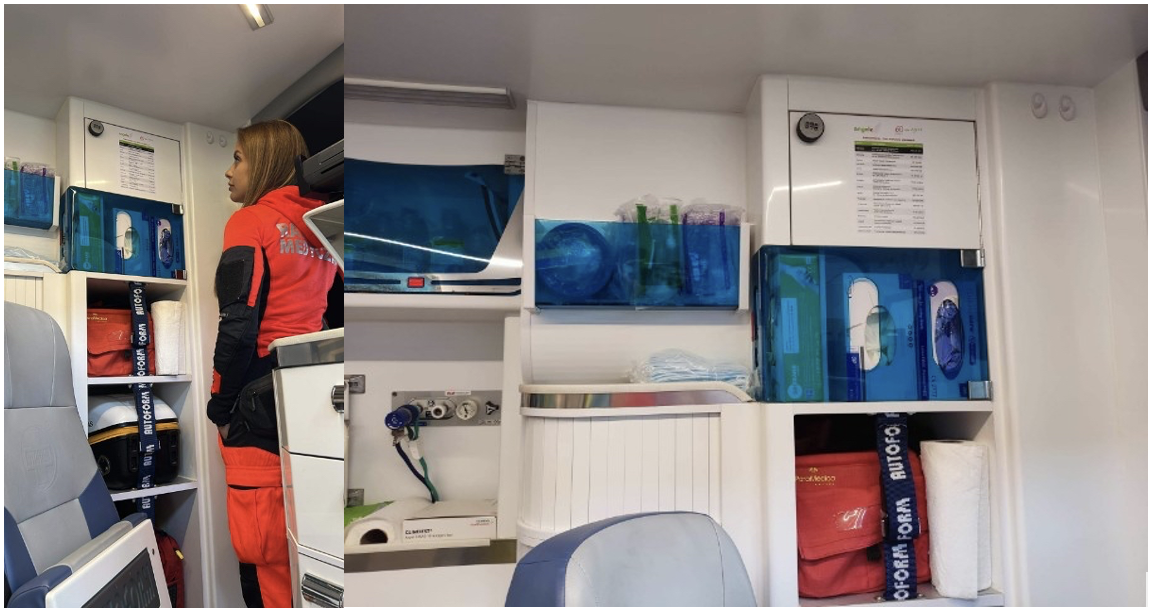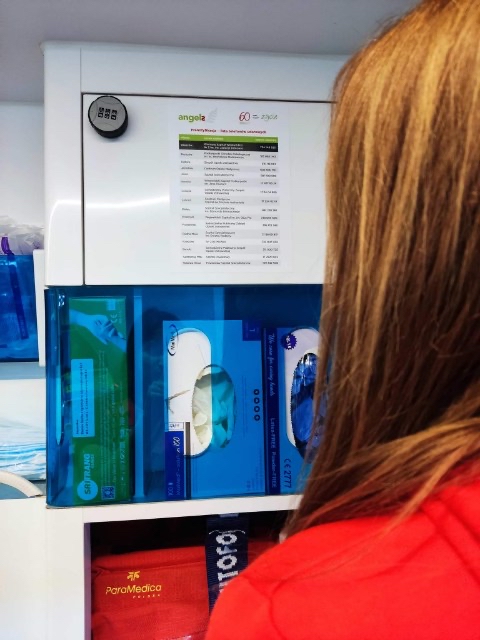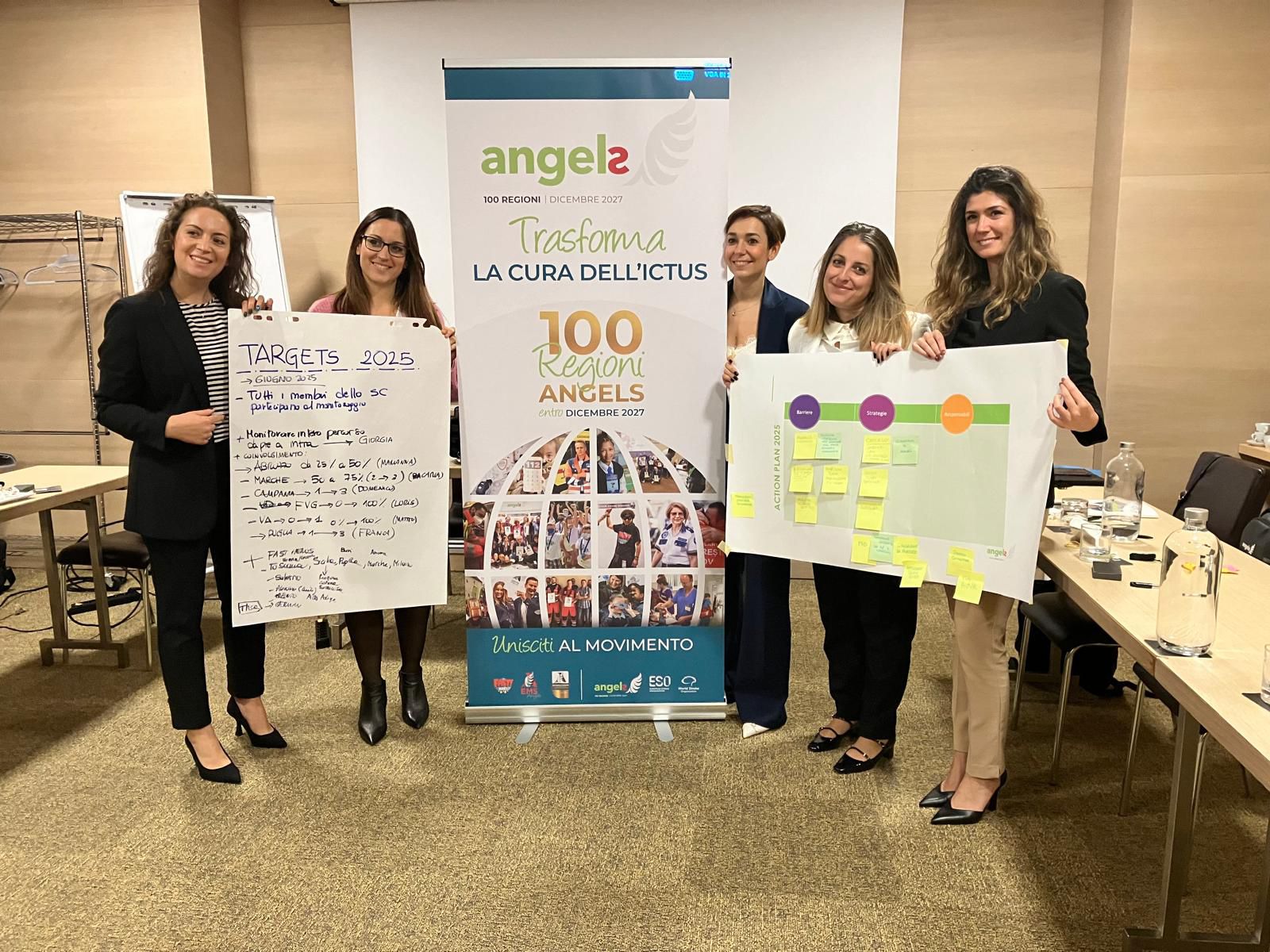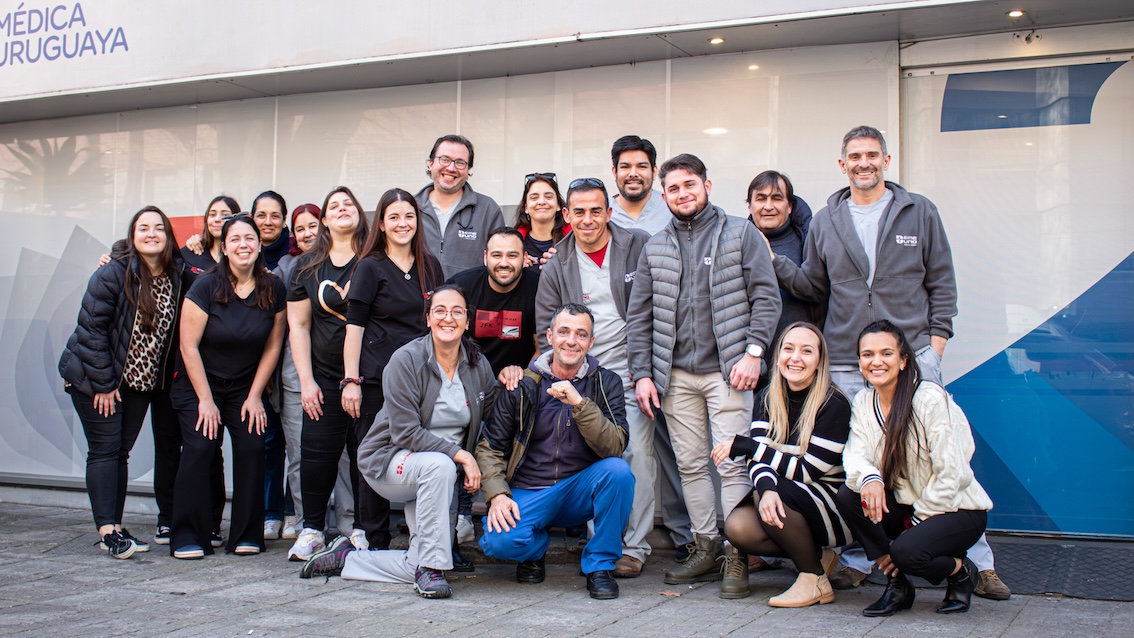
Es una pegatina normal, de unos 21 cm de alto y 15 cm de ancho. En la esquina superior izquierda se encuentra el logotipo de Angels; las palabras “60 minutos = vida” aparecen en la parte superior derecha, una lista de 16 números de teléfono a continuación. La pegatina tiene una fina capa adhesiva que, cuando se despega de la parte trasera, se pegará a casi cualquier superficie, como el panel interior de una ambulancia, por ejemplo.
De hecho, es probable que encuentre pegatinas exactamente como esta dentro de cada ambulancia en Podkarpackie, una provincia de montaña en la esquina sudeste de Polonia, donde la responsabilidad de la gestión del ictus recae en Prof Halina Bartosik-Psujek, que es el asesor de neurología de la región.
El 23 de marzo de este año, el Prof. Bartosik-Psujek estuvo encantado de dar la bienvenida a los jefes de neurología de las 16 unidades de ictus de la provincia a la primera reunión regional presencial desde el inicio de la pandemia. Tenían mucho de lo que hablar, incluido el hecho de que los retrasos en el tratamiento que surgieron de los datos regionales sobre el ictus apuntaban a deficiencias en el servicio de urgencias, donde la crisis prolongada de la Covid había alterado la formación, aumentado la rotación del personal y bajado la moral. El personal de ambulancias de toda la región carecía de la capacidad de diagnosticar el ictus, a menos que los síntomas fueran evidentes; no se utilizó ninguna escala de evaluación neurológica y prenotificación fue incoherente.
Entre las diversas intervenciones que surgirían de la reunión regional (incluidos los talleres de toma de decisiones, la formación de simulación y la implementación del protocolo FeSS), prevaleció la formación de los servicios de emergencias médicas. A finales de abril, menos de cuatro semanas después de la reunión regional, 60 miembros de los servicios de emergencias médicas de toda la región se reunirían en la próspera capital provincial de Rzeszów durante dos días de formación intensiva.
Antes del evento, la asesora de Angels Katarzyna Putyło pasó mucho tiempo llamando por teléfono a un conjunto específico de números. Los comentarios que había recibido de los servicios de urgencias indicaron que las llamadas a los teléfonos de ictus de algunas de las unidades de ictus de la región a menudo no se respondían. Katarzyna tenía un instinto de que el motivo podría ser sencillo y, cuando un número alarmante de veces que sus llamadas no se respondieron, se duplicó en su coraje: ¿Podrían los números estar equivocados?

Una simple explicación
La idea de que las explicaciones sencillas son generalmente mejores que las complejas es un principio de resolución de problemas atribuido a William of Ockham, un matemático y filósofo inglés nacido hace más de 700 años. Como se conoce el principio, la idea de Ockham es que, al construir una teoría, uno debería inclinarse por la simplicidad, ya que las explicaciones que se sobrecomprenden a menudo se alejan de la verdad.
Uno por uno, Katarzyna llamó a los hospitales de la provincia de Podkarpackie para preguntarse: “¿Cuál es su número de ictus, el número en el que alguien siempre recoge?” Las respuestas variaron. En algunos hospitales, el teléfono móvil de ictus se había vuelto inoperativo después de que se acabara la financiación. En un hospital de primer nivel con una circuito organizada para el ictus, el departamento de neurología se había trasladado a un nuevo edificio y su número había cambiado.
Una vez verificada o actualizada la cifra de cada teléfono de ictus en Podkarpackie, Katarzyna aplicó otro ictus de la cuchilla de Ockham. “Es una victoria hacer más con lo que se puede hacer con menos”, creía el gran lógico. Por lo tanto, en lugar de incluir el número de teléfono en el programa de formación o de diseñar un nuevo proceso para difundir la información actualizada, Katarzyna pidió suficientes pegatinas para cada ambulancia en la provincia de Podkarpackie y algunas que se podían evitar.

Una herramienta y un desencadenante
Desde los síntomas del ictus y los medicamentos del paciente hasta las escalas neurológicas, la formación proporcionada por el Dr. Rafal Kaczorowskiof del Hospital Clínico Provincial n.o 2 de Rzeszów abarcó todos los aspectos de la fase prehospitalaria, incluida una demostración en vídeo de la circuito del paciente con y sin prenotificación. Fue una herramienta de apertura de ojos para los equipos cuya propia circuito normalmente termina en el servicio de urgencias; se vieron impactados por la diferencia que una sola llamada telefónica podría suponer para una vida real.
Pero si el vídeo hacía el argumento para la prenotificación, la pegatina hacía aún más. Borró las barreras para la implementación al instalar en cada ambulancia de la provincia una herramienta y un desencadenante para una acción que salva vidas. No solo tenían los números a los que llamar al alcance de la mano, sino que el mensaje sobre prenotificación era imposible de pasar por alto.
Una vez finalizada la formación, Katarzyna se sorprendió al encontrar el objetivo de una cola de participantes que estaban recogiendo una pegatina adicional para un compañero ausente o compartiendo sus propias sugerencias sobre cómo se podría mejorar el servicio.
Con el compromiso de todos los equipos de servicios de emergencias médicas con prenotificación, y de todas las unidad de ictus con el teléfono, Katarzyna está satisfecha de que esta acción prioritaria clave ahora esté respaldada desde todas las perspectivas, incluidas las del Dr. Kaczorowski y el Prof. Bartosik-Psujek, cuyas sólidas reputacións deberían ser más que suficientes para desalentar la infracción.
Las ganancias obtenidas gracias a la pegatina ya han llegado a la uva, ya que varios hospitales informan de vías más uniformes y mejores tiempos de tratamiento como resultado de la prenotificación. Pero para medir realmente lo que una pegatina puede lograr, debes vigilar los premios EMS del próximo año y buscar equipos de ambulancias de la provincia de Podkarpackie entre los ganadores.



